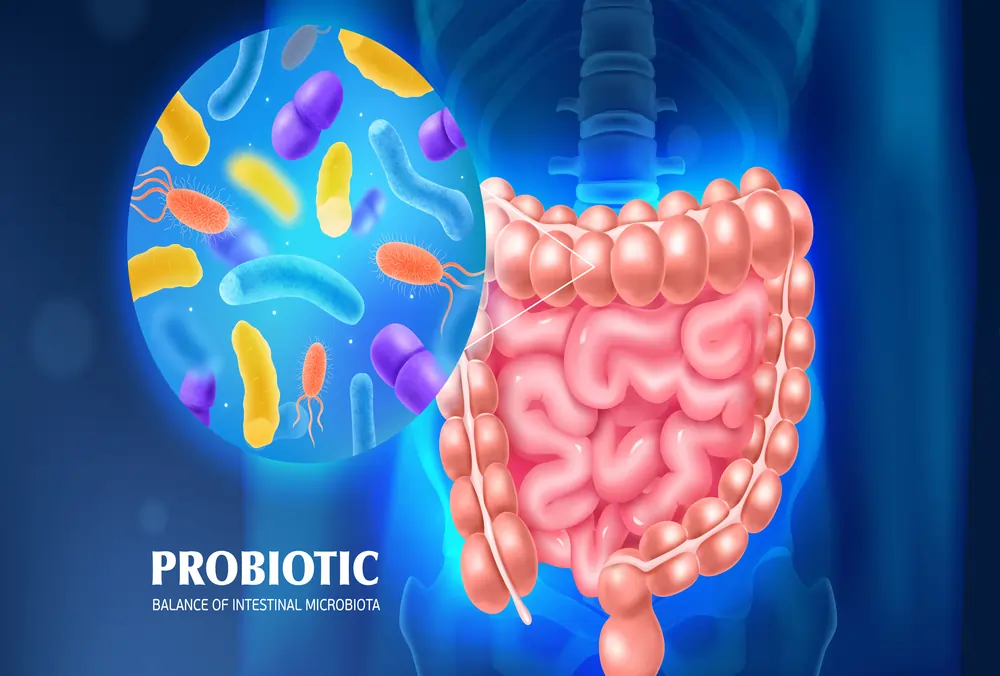
The Role of the Microbiome in Digestion
The human body is home to trillions of microorganisms, collectively known as the microbiome. These microorganisms reside in various bodily systems, including the digestive tract. The microbiome plays a vital role in maintaining overall health, and its influence on digestion is particularly significant. In this article, we will delve into the role of the microbiome in digestion, exploring its functions, benefits, and impact on overall well-being.
Introduction to the Microbiome
The microbiome refers to the diverse community of microorganisms that reside within and on our bodies. These microorganisms, including bacteria, viruses, fungi, and other microbes, play a crucial role in maintaining our overall health and well-being. The microbiome is found in various parts of our body, such as the skin, mouth, gut, and reproductive organs.
The microbiome interacts with our immune system, helps with digestion, synthesizes vitamins, and even influences our mood and behavior. It is a dynamic ecosystem that evolves throughout our lives, influenced by factors like diet, environment, genetics, and medication.
Understanding the microbiome has become a fascinating area of research, as scientists explore its potential impact on various aspects of human health, including chronic diseases, mental health disorders, and even personalized medicine. By unraveling the complexities of the microbiome, we may uncover new ways to promote wellness and develop innovative treatments in the future.
Now, let’s dive deeper into the microbiome’s role in digestion. These tiny inhabitants aid in breaking down food, extracting nutrients, and even influencing our metabolism. It’s like a bustling city within us, teeming with life that profoundly influences our well-being.
The Microbiome and Digestion: Fueling Optimal Nutrient Absorption
A. Unveiling the Role of the Microbiome in Digestion
The human body is home to trillions of microorganisms, collectively known as the microbiome, residing primarily in the gut. These tiny organisms play a crucial role in the complex process of digestion. Through a mutually beneficial relationship, the microbiome aids in breaking down food, extracting essential nutrients, and maintaining overall digestive health.
The microbiome acts as a powerful ally, producing enzymes and digestive compounds that our own bodies cannot generate. By breaking down complex carbohydrates, fiber, and other indigestible substances, these microorganisms convert them into simpler molecules that our bodies can absorb and utilize efficiently. This symbiotic partnership between our bodies and the microbiome ensures optimal digestion and nutrient extraction.
B. Understanding the Composition of the Microbiome in the Gut
The gut microbiome is an intricately diverse ecosystem comprising various microorganisms, including bacteria, viruses, fungi, and archaea. While each individual’s microbiome composition is unique, certain bacterial strains, such as Bacteroidetes and Firmicutes, are commonly found in the gut.
Maintaining a balanced and diverse microbiome is essential for digestive health. A rich microbial community contributes to the overall resilience of the gut, enhances nutrient absorption, and protects against harmful pathogens. Factors such as diet, genetics, lifestyle, and exposure to external microorganisms influence the composition of the microbiome, highlighting the dynamic nature of this complex ecosystem.
C. Unraveling the Influence of the Microbiome on Nutrient Absorption
The microbiome’s influence extends beyond aiding digestion; it actively participates in nutrient absorption. The microorganisms present in the gut help break down dietary components that our body cannot digest alone. They produce enzymes that assist in the breakdown of proteins, fats, and carbohydrates, facilitating their efficient absorption in the small intestine.
Moreover, the microbiome plays a crucial role in synthesizing certain vitamins and minerals, including vitamin K, B vitamins, and short-chain fatty acids. These essential nutrients produced by the microbiome are absorbed into our bloodstream and contribute to overall health and well-being.
However, an imbalanced or compromised microbiome can hinder nutrient absorption and lead to digestive issues. Disruptions caused by factors like poor diet, antibiotic use, stress, or illness can negatively impact the microbiome’s ability to support optimal nutrient absorption, potentially leading to deficiencies and digestive discomfort.
Factors that Influence the Microbiome and Digestion: Nurturing Gut Health for Overall Well-being

A. Embracing the Power of a Healthy Diet
The significance of a healthy diet in supporting a thriving microbiome and optimal digestion cannot be overstated. Consuming a diverse range of nutrient-rich foods, particularly fruits, vegetables, whole grains, and lean proteins, provides essential nourishment for both our bodies and the beneficial microorganisms in our gut.
A diet high in fiber promotes the growth of beneficial bacteria, aiding in the fermentation of fiber and the production of short-chain fatty acids. These fatty acids play a vital role in maintaining gut integrity, reducing inflammation, and supporting healthy digestion. Additionally, incorporating probiotic-rich foods like yogurt, kefir, and sauerkraut can introduce beneficial bacteria into the gut, fostering a balanced and resilient microbiome.
B. Understanding the Impact of Medication and Antibiotics
While medications and antibiotics can be life-saving interventions, they can also disrupt the delicate balance of the microbiome. Antibiotics, in particular, are designed to eliminate harmful bacteria, but they can inadvertently wipe out beneficial bacteria as well. This disruption can lead to imbalances in the microbiome, potentially causing digestive disturbances like diarrhea, bloating, or even more severe conditions.
It is crucial to use antibiotics judiciously and under medical supervision. In cases where antibiotic use is necessary, it is advisable to supplement with probiotics during and after the course of treatment to help restore and maintain a healthy microbiome.
C. Recognizing the Role of Stress and Lifestyle Factors
Stress and lifestyle factors can significantly impact the diversity and composition of the microbiome. Chronic stress triggers a cascade of physiological responses that can disrupt the delicate balance of the gut ecosystem. High stress levels have been associated with alterations in gut microbiota, potentially leading to digestive issues, compromised immune function, and increased susceptibility to gastrointestinal disorders.
Adopting stress management techniques such as regular exercise, mindfulness practices, and adequate sleep can help support a healthy microbiome. Additionally, maintaining a balanced lifestyle that includes regular physical activity, minimizing alcohol consumption, avoiding smoking, and getting sufficient hydration can contribute to digestive well-being.
The Microbiome and Gut-Related Diseases: Exploring Connections and Therapeutic Potential
A. Unraveling the Link between the Microbiome and Gut-related Diseases
Scientific research has shed light on the intricate relationship between the microbiome and gut-related diseases. The composition and function of the microbiome play a crucial role in maintaining gut health and preventing the development of various conditions. Imbalances or disruptions in the microbiome have been associated with gut-related diseases such as inflammatory bowel disease (IBD) and irritable bowel syndrome (IBS).
B. Microbiome’s Role in Inflammatory Bowel Disease and Irritable Bowel Syndrome
Inflammatory Bowel Disease (IBD), which includes conditions like Crohn’s disease and ulcerative colitis, involves chronic inflammation of the digestive tract. Studies have shown that individuals with IBD often exhibit alterations in their gut microbiome. Imbalances in bacterial diversity reduced beneficial bacteria, and an increase in harmful bacteria has been observed in IBD patients. These imbalances can contribute to the inflammatory processes and symptoms associated with IBD.
Similarly, Irritable Bowel Syndrome (IBS) is a functional gastrointestinal disorder characterized by symptoms like abdominal pain, bloating, and changes in bowel habits. While the exact causes of IBS are still being researched, there is growing evidence suggesting a connection between the microbiome and IBS. Imbalances in the gut microbiome composition, alterations in bacterial metabolites, and abnormal gut-brain communication are believed to contribute to the development and exacerbation of IBS symptoms.
C. Microbiome-Based Therapies for Gut-Related Diseases
The emerging field of microbiome-based therapies holds promise for the treatment of gut-related diseases. Several approaches are being explored to restore a healthy microbiome and alleviate symptoms associated with these conditions.

1. Probiotics: Probiotics are live microorganisms that, when consumed, confer health benefits. They can help restore microbial imbalances by introducing beneficial bacteria into the gut. Probiotics have shown potential in reducing inflammation, improving gut barrier function, and alleviating symptoms in certain gut-related diseases.
2. Fecal Microbiota Transplantation (FMT): FMT involves transferring fecal material from a healthy donor to a recipient with a disrupted microbiome. This procedure aims to restore a healthy microbial composition and function in the recipient’s gut. FMT has demonstrated remarkable success in treating recurrent Clostridium difficile infection and is being explored as a potential therapy for other gut-related diseases.
3. Prebiotics and Dietary Interventions: Prebiotics are non-digestible fibers that serve as a food source for beneficial bacteria in the gut. Consuming prebiotic-rich foods or supplements can selectively promote the growth of beneficial bacteria, thereby supporting a healthy microbiome. Dietary interventions tailored to specific gut-related diseases, such as low-FODMAP diets for IBS, are also being utilized to manage symptoms by modulating the microbiome.
4. Microbial Therapeutics: Researchers are working on developing targeted therapies that involve the use of specific bacteria or their metabolites to modulate the microbiome and treat gut-related diseases. These innovative approaches aim to restore microbial imbalances and promote a healthy gut environment.
The Future of Microbiome Research: Exploring New Horizons for Gut Health
A. Ongoing Research on the Microbiome
Microbiome research is a rapidly evolving field, with ongoing studies shedding light on the intricate relationship between our gut microbiome and overall health. Researchers are investigating various aspects of the microbiome, including its composition, function, and interactions with the host. With the advent of high-throughput sequencing and advanced computational techniques, scientists are now able to analyze complex microbial communities in unprecedented detail.
Current research is exploring the role of the microbiome in a wide range of conditions, from gut-related diseases to non-gastrointestinal disorders such as metabolic syndrome, neurodegenerative diseases, and even mental health conditions. Studies have also shown that the microbiome can influence drug metabolism, potentially impacting drug efficacy and safety.
B. Potential of Microbiome Research for Gut Health
The potential of microbiome research for gut health is immense. As we continue to understand the intricate connections between our gut microbiome and overall health, the possibilities for targeted interventions and personalized treatments are expanding. Microbiome-based therapies, such as probiotics, prebiotics, and fecal microbiota transplantation, are already being used to treat certain gut-related diseases with promising results.
In addition, the potential for microbiome-based diagnostics is being explored, with the microbiome serving as a biomarker for disease risk and progression. By analyzing the composition and function of the microbiome, researchers can gain insights into disease mechanisms and develop novel therapeutic strategies.
Furthermore, microbiome research is opening up new avenues for preventive health. By understanding the factors that influence the microbiome, we can develop targeted interventions to promote a healthy gut environment. Lifestyle modifications, dietary interventions, and even the use of microbiome-modulating drugs are all potential strategies for optimizing gut health and preventing disease.
Conclusion
In summary, the microbiome plays a vital role in breaking down and absorbing nutrients, highlighting its paramount importance in maintaining overall health. The composition of the gut microbiome can be impacted by diet, medication, and lifestyle choices, with a healthy diet rich in fiber and probiotics supporting a diverse and balanced microbiome, optimizing digestion. However, the use of antibiotics and unhealthy lifestyle habits can disrupt the microbiome, potentially leading to digestive issues. Understanding the connection between the microbiome and gut-related diseases, such as inflammatory bowel disease and irritable bowel syndrome, opens up avenues for microbiome-based therapies, with probiotics, prebiotics, and fecal microbiota transplantation showing promise in managing these conditions.
Ongoing research in the field of microbiome offers exciting possibilities for the future, with advancements in technology and scientific understanding providing opportunities to enhance digestive health, prevent gut-related diseases, and develop personalized interventions. By comprehending the intricacies of the microbiome in digestion, individuals can make informed choices to support a healthy gut and overall well-being, prioritizing a balanced diet, mindful medication use, stress management, and staying updated with the latest research to empower them to optimize their digestive health and unlock the full potential of the microbiome.
FAQs
- Can I improve my microbiome through diet alone?
- While diet is a significant influencer, other factors like stress management and physical activity also contribute to a healthy microbiome.
- Why is microbiome diversity crucial for digestion?
- Microbiome diversity ensures a balanced ecosystem in your gut, aiding in efficient digestion and nutrient absorption.
- What are some signs of microbiome imbalance?
- Symptoms like bloating, irregular bowel movements, and fatigue may indicate a microbiome imbalance.
- Is there a specific diet to follow for a healthy microbiome?
- Emphasize whole foods, fiber-rich fruits and vegetables, fermented foods, and adequate hydration to promote microbiome health.
- How quickly can lifestyle changes positively impact the microbiome?
- Depending on individual factors, positive changes in diet and lifestyle can show improvements in the microbiome within a few weeks to months.


